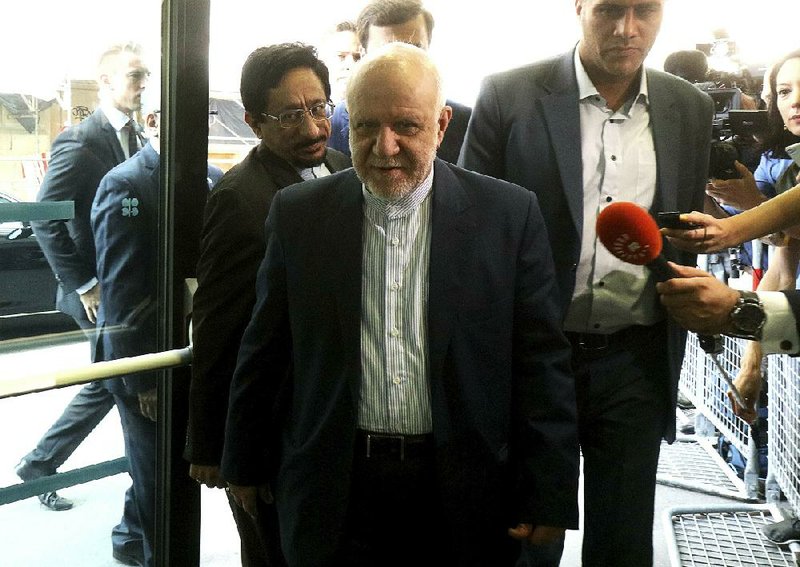Oil prices had their worst reaction to an OPEC meeting in more than four years, sliding just after the cartel agreed to prolong production curbs as fears about the global economy mount.
With strong backing from Russia, the biggest member of a group of non-OPEC nations that met Tuesday, the proposal gained unanimous approval. OPEC members on Monday decided to extend the deal.
"In order to help maintain the current stable status of the market and avoid buildup of inventories, we have decided to keep the level and the magnitude of the cuts intact," Russian Energy Minister Alexander Novak said after the vote.
The 10 non-OPEC nations present at the meeting, held in Vienna at the headquarters of the Organization of the Petroleum Exporting Countries, included Mexico, Bahrain, Oman and Kazakhstan.
Futures closed the day down 4.8% in New York, the steepest decline since May 31 and the biggest drop after an OPEC gathering since November 2014.
Mark Carney, governor of the Bank of England, warned of dangers from rising protectionism around the globe, citing a "widespread slowdown" that may require a major policy response. That added to worries after weak manufacturing reports from the U.S., China and Europe.
The current deal to support prices reduced production by 1.2 million barrels per day for six months starting from Jan. 1. With the extension, it will now run into next year. Most of the cuts came from OPEC nations, who agreed to reduce 800,000 barrels per day, with the rest of the cuts coming from Russia and other non-OPEC countries.
Though tensions between the U.S. and Iran and attacks on tankers near the Strait of Hormuz have pushed up oil prices in recent days, there are concerns among members that over the longer term, demand could weaken because of slower global growth. The International Energy Agency, a group of oil-consuming countries, recently cut its demand estimate.
Anxieties blotted out optimism despite Tuesday's agreement. Divisions remained over Saudi Arabia's push to target even deeper reductions, with Russia expressing doubts at the end of the summit.
"There are concerns that demand might slow to where it overpowers supply," said Bart Melek, head of commodity strategy at Toronto's TD Securities. The "gloomy" data, especially from China, "is very much part and parcel of what we're seeing."
West Texas Intermediate crude for August delivery slipped $2.84 to settle at $56.25 a barrel on the New York Mercantile Exchange. The slide accelerated as the contract crashed through several key technical trading levels, with West Texas Intermediate crossing below its 50-, 100- and 200-day moving averages.
Brent crude for September settlement declined $2.66, to $62.40 a barrel, on the ICE Futures Europe Exchange.
Heading into the meeting, Saudi Arabia said the nine-month extension was the right move to make given the current market conditions.
"I see demand picking up strongly in the second half of the year, and I see compliance greatly improving," Saudi Arabian Energy Minister Khalid Al-Falih told reporters. "And I see the length of this agreement as nine months sufficiently long to bring inventories down and to balance the market."
The drop in crude prices on Tuesday was an "anomaly," OPEC Secretary-General Mohammad Barkindo told reporters.
Yet Russia questioned a Saudi proposal to use the average of 2010 to 2014 global oil inventories to set future production targets. That move, a change from the current policy, would require deeper cuts but would achieve the higher prices the Saudis need to balance their budget.
The pact leaves the door open for U.S. shale producers to grab more market share, as OPEC will have to cut deeper to achieve inventory targets, according to Goldman Sachs Group Inc. The decision creates a clearer downside risk to the bank's forecast for Brent crude to average $60 a barrel next year, even though it could result in some shorter-term price spikes.
The structure of the Brent crude market suggests investors may be losing faith that OPEC and its allies' extension will be enough to stave off an oversupply of oil.
Information for this article was contributed by Alex Nussbaum, Alex Longley, James Thornhill, Dan Murtaugh, Heesu Lee and Harkiran Dhillon of Bloomberg News and by Kiyoko Metzler and David Rising of The Associated Press.
Business on 07/03/2019
